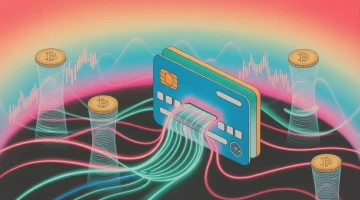Unveiling DePIN Development and How It Works

Table of contents:
What is DePIN Development?
DePIN development, short for Decentralized Physical Infrastructure Networks development, is a cutting-edge solution that harnesses the power of blockchain and web3 technologies to create decentralized networks for managing physical infrastructure. At its core, DePIN development aims to address the inefficiencies, lack of transparency, and high costs associated with traditional infrastructure systems.
Picture a city struggling with traffic, old power grids, and water management systems that aren't very efficient. Traditional solutions often involve lots of paperwork, decisions made by a few people in the center, and not a lot of transparency. DePIN development offers a new way of controlling such important things by giving control to communities and letting them take an active role in the management of their own infrastructure.
Physical infrastructure encompasses a wide array of elements that form the backbone of the digital world, including but not limited to:
- Telecommunication networks
- Transportation infrastructure
- Energy infrastructure
- Data storage and processing centers
- Wireless networks
- Water and sanitation infrastructure
- Communication infrastructure
- Information technology infrastructure
- Public facilities and amenities
- Environmental infrastructure
- Urban infrastructure
- Industrial and economic infrastructure, and more.
DePIN development serves as a vital link between the physical world and the blockchain realm, facilitating the seamless exchange of data and value. By leveraging the decentralized nature of blockchain, DePIN opens up new possibilities for innovation and collaboration. This helps to create a more connected and resilient digital infrastructure.
Market State of DePIN Projects
Despite the relatively early stage of DePIN projects development, there has already been a notable increase in the market capitalization of DePIN tokens. As of February 2024, the market cap has surpassed an impressive milestone of $25 billion. The compute, storage, and AI categories stand out as frontrunners, collectively commanding the majority share of the DePIN tokens' market capitalization.

This exponential growth in market capitalization reflects the increasing demand for decentralized infrastructure solutions, driven by the need for enhanced transparency, efficiency, and resilience in infrastructure networks. Following this trend, a distinct DePIN sector has emerged on prominent cryptocurrency monitoring platforms such as DropsTab and CoinMarketCap. For instance, below are presented top DePIN coins by market cap according to CoinGecko on April 26, 2024.

Top DePIN coins by market cap according to CoinGecko
As businesses and industries continue to embrace DePIN projects, we can expect further expansion and diversification of the decentralized infrastructure ecosystem, fueling innovation and driving value creation across the board. Moreover, various other sectors are rapidly evolving at the intersection of the Internet of Things (IoT) and Web3. These encompass areas such as RWA (Real World Assets), ReFi (Decentralized Finance for Real World Assets), DeSci (Decentralized Science), and DeSoc(Decentralized Social Networks).
How Does DePIN Development Work?
Central to decentralized physical infrastructure networks is the concept of tokenization. By tokenizing real-world assets, such as real estate, commodities, and infrastructure projects, into digital tokens, these networks enable seamless trading, fractional ownership, and global accessibility. This democratizes investment opportunities, offering investors, asset owners, and developers unprecedented avenues for innovation and participation in the market.
DePIN projects operate by offering incentives to stakeholders to develop physical infrastructure networks accessible to both individuals and automated systems. These networks can be deployed without substantial initial investments. Project tokens are used to motivate the deployment of the hardware segment of the infrastructure.
DePIN projects are typically composed of three principal components:
1. Physical Network Infrastructure: This includes the tangible elements of the infrastructure network, such as telecommunications equipment, data storage centers, and sensor networks.
2. Blockchain Platform: A blockchain platform forms the backbone of the DePIN project development, providing a secure and transparent ledger for recording transactions, managing assets, and executing smart contracts.
3. Token-Based Incentives: Project tokens serve as incentives to encourage stakeholders to participate in the development, maintenance, and utilization of the infrastructure network. These tokens may be used for various purposes, such as rewarding providers for leasing out hardware or incentivizing users to contribute data or resources to the network.
By integrating these elements, DePIN projects create a decentralized ecosystem where stakeholders can collaborate, transact, and innovate in a trustless and efficient manner. This approach not only reduces costs and inefficiencies but also fosters greater transparency, resilience, and inclusivity in infrastructure development and management.
Smart Contracts Role in DePIN Development
Smart contracts are a key driver of innovation, efficiency, and transparency in DePIN project development. These self-executing contracts, powered by blockchain technology, automate and enforce the agreed terms between parties, eliminating the need for intermediaries. Smart contracts development enables the automation of various infrastructure operations within DePIN ecosystem, facilitating seamless energy transactions, peer-to-peer interactions, conditional payments, and incentives.
For instance, consider a decentralized transportation network where smart contracts are employed to automate ride-sharing transactions. When a passenger requests a ride and the driver accepts the request, a smart contract is triggered. This event could be a successful match between the passenger and driver. Once the conditions are met, such as the completion of the ride, the smart contract automatically executes predefined actions, such as transferring payment to the driver and updating the records of both parties. This self-executing logic eliminates the need for intermediaries and manual intervention, streamlining the ride-sharing process and enhancing the efficiency of the transportation network.
By recording all transactions and agreements on a tamper-proof blockchain ledger, smart contracts provide stakeholders with transparent and auditable records of infrastructure operations, fostering trust and reducing the risk of fraud. Moreover, smart contracts streamline dispute resolution processes, automating the escalation and resolution of disputes based on predefined criteria. Overall, smart contracts are indispensable tools in the DePIN development, empowering stakeholders to build resilient, efficient, and inclusive infrastructure ecosystems.
Benefits of DePIN Development
Let's explore the benefits that DePIN project development offers:
Transparency and Accountability
One of the key advantages of DePIN development lies in its ability to enhance transparency and accountability in infrastructure management. By leveraging blockchain technology, DePINs create a tamper-proof record of transactions and decisions, providing stakeholders with unprecedented visibility into the infrastructure ecosystem. This transparency fosters trust among participants and reduces the risk of corruption and mismanagement.
Cost Savings
Traditional infrastructure projects often involve lengthy bureaucratic processes, high overhead costs, and reliance on intermediaries. In contrast, DePIN development offers a more cost-effective approach by eliminating intermediaries and streamlining processes. With fewer bureaucratic hurdles and lower administrative costs, DePINs enable stakeholders to realize significant cost savings throughout the infrastructure lifecycle.
Efficiency and Resilience
DePINs enhance the efficiency and resilience of infrastructure networks by enabling real-time data sharing and decision-making. By leveraging decentralized principles, DePINs reduce the reliance on centralized control points, making infrastructure networks more resilient to disruptions and failures. Additionally, the transparent and immutable nature of blockchain technology enhances data integrity and security, further bolstering the resilience of DePINs.
Community Engagement and Social Impact
Businesses have a responsibility to engage with the communities they serve and create positive social impact. DePIN development enables businesses to actively participate in community-driven infrastructure projects and contribute to sustainable development initiatives. By engaging with local communities, businesses can build trust, enhance their reputation, and create lasting value for society.
Anti-Monopoly
One significant advantage of DePIN development is its potential to combat monopoly power in infrastructure provision. Traditional infrastructure projects are often dominated by large corporations or government entities, leading to monopolistic practices and limited competition. DePINs, by decentralizing control and ownership, promote a more equitable distribution of infrastructure assets and resources. This decentralization fosters competition, innovation, and diversity in infrastructure provision, ultimately benefiting consumers and promoting economic growth.
Real-World Applications
The benefits of DePIN development are not merely theoretical, they are being realized in real-world applications across various industries. From decentralized energy grids and peer-to-peer transportation networks to community-owned water systems and blockchain-based supply chain solutions, DePINs are transforming the way we conceptualize and implement infrastructure projects.
Innovation and Collaboration
DePIN project development fosters innovation and collaboration by providing a platform for stakeholders to experiment with new technologies and business models. By leveraging blockchain technology, DePINs enable seamless integration of diverse infrastructure assets and systems, facilitating interoperability and innovation. Additionally, the transparent and open nature of DePINs encourages collaboration among stakeholders, driving collective problem-solving and knowledge sharing.
Real-World Examples of DePIN Projects Development Across Sectors
Across various sectors, real-world examples of DePIN projects showcase the versatility and potential of decentralized infrastructure networks. Let's explore these examples categorized by their respective sectors:
Wireless Networking
Helium: Uses blockchain technology to create a decentralized wireless network powered by individual hotspots. This enables IoT connectivity and encourages users to take part in network expansion. Helium has introduced new concepts for verifying physical network activity on the chain (i.e. Proof of Coverage). They also has achieved some impressive scaling for IoT wireless connectivity.
Cloud Storage
Filecoin: The cloud storage market is pretty similar to Helium. Filecoin actually inspired Helium’s token model. It revolutionizes data storage by incentivizing users to rent out their unused storage space, creating a decentralized storage network that is more resilient and cost-effective than traditional centralized solutions.
VPN
Orchid: Provides a decentralized VPN solution, allowing users to access the internet securely and privately without relying on centralized VPN providers, thus enhancing privacy and circumventing censorship.
Geospatial Networks
Hivemapper: Leverages decentralized infrastructure to create alternative global maps and provide up-to-date, uncensored data on air quality and road traffic. Drivers equipped with Hivemapper DVRs record their surroundings and receive tokens as rewards, incentivizing data contribution and fostering a decentralized mapping ecosystem.
These examples show how DePIN projects can disrupt traditional industries and offer users decentralized alternatives that prioritize transparency, efficiency, and user sovereignty. As businesses contemplate the evolving landscape of DePIN development, they can draw inspiration from these projects to envision and create their own unique solutions.
DePIN Marketplace Development: A Catalyst for Decentralized Physical Infrastructure
DePIN marketplaces development is a crucial component of the DePIN ecosystem. These marketplaces serve as platforms where individuals and organizations can buy, sell, and lease physical infrastructure assets. By facilitating the exchange of these assets, DePIN marketplaces foster a more efficient and equitable distribution of physical infrastructure resources.
Key Features of DePIN Marketplaces:
- Tokenization of Physical Assets: DePIN marketplaces tokenize physical infrastructure assets, converting them into crypto tokens that can be traded on a blockchain.
- Transparent Market Information: DePIN marketplaces provide real-time market data, including asset prices, historical performance, and energy production data. This transparency empowers investors to make informed decisions and helps to ensure fair pricing.
- Decentralized Governance: DePIN marketplaces are often governed by decentralized autonomous organizations (DAOs), which allow stakeholders to participate in decision-making processes. This democratic approach ensures that the marketplace operates in the best interests of its users.
- Integration with Renewable Energy Platforms: DePIN marketplaces can be integrated with renewable energy platforms to facilitate the purchase and sale of renewable energy credits (RECs). This helps to promote clean energy adoption and support sustainable development.
As the DePIN ecosystem continues to evolve, the development of robust and user-friendly marketplaces will be essential for driving adoption and realizing the full potential of decentralized physical infrastructure. By providing a platform for the exchange of physical assets, DePIN marketplaces can contribute to a more sustainable, equitable, and prosperous future.
Ready to Build Your Own DePIN Project?
As we witness the rising market capitalization and proliferation of DePIN projects across various sectors, the opportunities for businesses to innovate and capitalize on decentralized infrastructure are more compelling than ever. By embracing the benefits of transparency, efficiency, and user sovereignty offered by DePIN development, businesses can unlock new avenues for growth and differentiation in an increasingly competitive landscape. Inspired by the success stories and transformative potential of existing DePIN projects, now is the time to seize the moment and embark on the journey of building your own unique DePIN solution. At Rock'n'Block, we specialize in blockchain development and are ready to transform your visions into reality. Contact us today to explore how we can collaborate to bring your DePIN project to life and capitalize on the exciting opportunities that lie ahead in the decentralized future.
We ❤️ Development
Follow us on social media to receive the hottest blockchain development updates
Twitter ⚡️Telegram⚡️LinkedIn⚡️Facebook












%201.webp)



